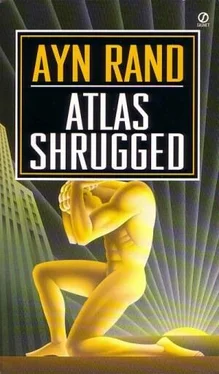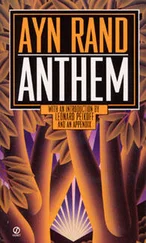She tried to think; but the music remained on the edge of her mind and she kept hearing it, in full chords, like the implacable steps of something that could not be stopped. . . . She shook her head angrily, jerked her hat off and lighted a cigarette.
She would not sleep, she thought; she could last until tomorrow night. . . . The train wheels clicked in accented rhythm. She was so used to them that she did not hear them consciously, but the sound became a sense of peace within her. . . . When she extinguished her cigarette, she knew that she needed another one, but thought that she would give herself a minute, just a few minutes, before she would light it. . . .
She had fallen asleep and she awakened with a jolt, knowing that something was wrong, before she knew what it was: the wheels had stopped. The car stood soundless and dim in the blue glow of the night lamps. She glanced at her watch: there was no reason for stopping. She looked out the window: the train stood still in the middle of empty fields.
She heard someone moving in a seat across the aisle, and asked, "How long have we been standing?"
A man's voice answered indifferently, "About an hour." The man looked after her, sleepily astonished, because she leaped to her feet and rushed to the door. There was a cold wind outside, and an empty stretch of land under an empty sky. She heard weeds rustling in the darkness. Far ahead, she saw the figures of men standing by the engine—and above them, hanging detached in the sky, the red light of a signal.
She walked rapidly toward them, past the motionless line of wheels. No one paid attention to her when she approached. The train crew and a few passengers stood clustered under the red light. They had stopped talking, they seemed to be waiting in placid indifference.
"What's the matter?" she asked.
The engineer turned, astonished. Her question had sounded like an order, not like the amateur curiosity of a passenger. She stood, hands in pockets, coat collar raised, the wind beating her hair in strands across her face.
"Red light, lady," he said, pointing up with his thumb.
"How long has it been on?"
"An hour."
"We're off the main track, aren't we?"
"That's right."
"Why?"
"I don't know."
The conductor spoke up. "I don't think we had any business being sent off on a siding, that switch wasn't working right, and this thing's not working at all." He jerked his head up at the red light. "I don't think the signal's going to change. I think it's busted."
"Then what are you doing?"
"Waiting for it to change."
In her pause of startled anger, the fireman chuckled. "Last week, the crack special of the Atlantic Southern got left on a siding for two hours—just somebody's mistake."
"This is the Taggart Comet," she said. "The Comet has never been late."
"She's the only one in the country that hasn't," said the engineer.
"There's always a first time," said the fireman.
"You don't know about railroads, lady," said a passenger.
"There's not a signal system or a dispatcher in the country that's worth a damn."
She did not turn or notice him, but spoke to the engineer.
"If you know that the signal is broken, what do you intend to do?"
He did not like her tone of authority, and he could not understand why she assumed it so naturally. She looked like a young girl; only her mouth and eyes showed that she was a woman in her thirties. The dark gray eyes were direct and disturbing, as if they cut through things, throwing the inconsequential out of the way. The face seemed faintly familiar to him, but he could not recall where he had seen it.
"Lady, I don't intend to stick my neck out," he said.
"He means," said the fireman, "that our job's to wait for orders."
"Your job is to run this train."
"Not against a red light. If the light says stop, we stop."
"A red light means danger, lady," said the passenger.
"We're not taking any chances," said the engineer. "Whoever's responsible for it, he'll switch the blame to us if we move. So we're not moving till somebody tells us to."
"And if nobody does?"
"Somebody will turn up sooner or later."
"How long do you propose to wait?"
The engineer shrugged. "Who is John Galt?"
"He means," said the fireman, "don't ask questions nobody can answer."
She looked at the red light and at the rail that went off into the black, untouched distance.
She said, "Proceed with caution to the next signal. If it's in order, proceed to the main track. Then stop at the first open office."
"Yeah? Who says so?"
"I do."
"Who are you?"
It was only the briefest pause, a moment of astonishment at a question she had not expected, but the engineer looked more closely at her face, and in time with her answer he gasped, "Good God!"
She answered, not offensively, merely like a person who does not hear the question often: "Dagny Taggart."
"Well, I'll be—" said the fireman, and then they all remained silent. She went on, in the same tone of unstressed authority. "Proceed to the main track and hold the train for me at the first open office."
"Yes, Miss Taggart."
"You'll have to make up time. You've got the rest of the night to do it. Get the Comet in on schedule."
"Yes, Miss Taggart."
She was turning to go, when the engineer asked, "If there's any trouble, are you taking the responsibility for it, Miss Taggart?"
"I am."
The conductor followed her as she walked back to her car. He was saying, bewildered, "But . . . just a seat in a day coach, Miss Taggart? But how come? But why didn't you let us know?"
She smiled easily. "Had no time to be formal. Had my own car attached to Number 22 out of Chicago, but got off at Cleveland—and Number 22 was running late, so I let the car go. The Comet came next and I took it. There was no sleeping-car space left."
The conductor shook his head. "Your brother—he wouldn't have taken a coach."
She laughed. "No, he wouldn't have."
The men by the engine watched her walking away. The young brakeman was among them. He asked, pointing after her, "Who is that?"
" That's who runs Taggart Transcontinental," said the engineer; the respect in his voice was genuine. "That's the Vice-president in Charge of Operation."
When the train jolted forward, the blast of its whistle dying over the fields, she sat by the window, lighting another cigarette. She thought: It's cracking to pieces, like this, all over the country, you can expect it anywhere, at any moment. But she felt no anger or anxiety; she had no time to feel.
This would be just one more issue, to be settled along with the others. She knew that the superintendent of the Ohio Division was no good and that he was a friend of James Taggart. She had not insisted on throwing him out long ago only because she had no better man to put in his place. Good men were so strangely hard to find. But she would have to get rid of him, she thought, and she would give his post to Owen Kellogg, the young engineer who was doing a brilliant job as one of the assistants to the manager of the Taggart Terminal in New York; it was Owen Kellogg who ran the Terminal. She had watched his work for some time; she had always looked for sparks of competence, like a diamond prospector in an unpromising wasteland. Kellogg was still too young to be made superintendent of a division; she had wanted to give him another year, but there was no time to wait. She would have to speak to him as soon as she returned.
The strip of earth, faintly visible outside the window, was running faster now, blending into a gray stream. Through the dry phrases of calculations in her mind, she noticed that she did have time to feel something: it was the hard, exhilarating pleasure of action.
Читать дальше










